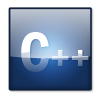
Flux Entrée/sorties
En C++, le détail des opérations d'écriture sur l'écran ou dans un fichier, ou celui de la lecture à
partir du clavier ou dans un fichier sont encapsulés dans les flux. Les flux prennent en charge le
transport puis l'affichage ou l'écriture des données sur le disque ou l'écran de l'ordinateur.
Stdio
| specifier | Output | Example |
|---|---|---|
| c | Character | a |
| d or i | Signed decimal integer | 392 |
| e | Scientific notation (mantise/exponent) using e character | 3.9265e+2 |
| E | Scientific notation (mantise/exponent) using E character | 3.9265E+2 |
| f | Decimal floating point | 392.65 |
| g | Use the shorter of %e or %f | 392.65 |
| G | Use the shorter of %E or %f | 392.65 |
| o | Signed octal | 610 |
| s | String of characters | sample |
| u | Unsigned decimal integer | 7235 |
| x | Unsigned hexadecimal integer | 7fa |
| X | Unsigned hexadecimal integer (capital letters) | 7FA |
| p | Pointer address | B800:0000 |
| n | Nothing printed. The argument must be a pointer to a signed int, where the number of characters written so far is stored. | |
| % | A % followed by another % character will write % to stdout. |
Iostream
Si nous avions un "input" qui ne correspondait pas à ce que nous attendions :
- std::cin.clear(), pour sortir le flux de l'état d'échec.
- std::cin.ignore(...), supprimer le mauvais input de notre flux.
- et recommencer



